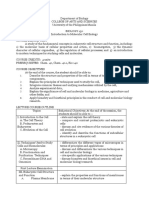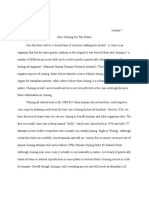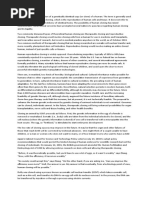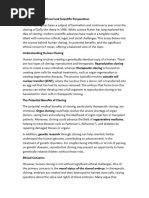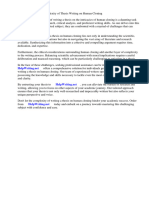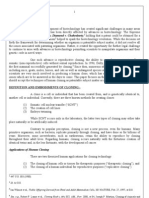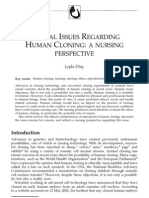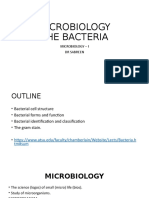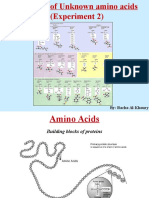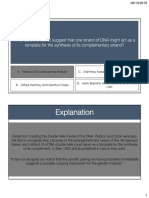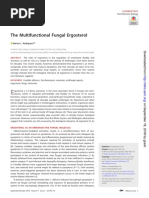Cloning: What Has Been Cloned?
Cloning: What Has Been Cloned?
Uploaded by
Keisha NguyenCopyright:
Available Formats
Cloning: What Has Been Cloned?
Cloning: What Has Been Cloned?
Uploaded by
Keisha NguyenOriginal Title
Copyright
Available Formats
Share this document
Did you find this document useful?
Is this content inappropriate?
Copyright:
Available Formats
Cloning: What Has Been Cloned?
Cloning: What Has Been Cloned?
Uploaded by
Keisha NguyenCopyright:
Available Formats
9/3/11
Genetics Task B
Keisha Nguyen 10G
Cloning
Cloning is one of the most controversial topics discussed today as it raises questions around ethics. The term cloning refers to the process of creating an identical copy of an organism or part of an organism. The following factors discussed and presented will review the basis of cloning as well as the possibilities and negatives associated with it.
What has been cloned?
Cloning is used in many places globally including Scotland, where the first successful clone of an adult mammal occurred. In 1997, Dolly the lamb was born and was found to be genetically identical to its mother. During the year 2000, Australia also had its first cloned sheep and calf. Other animals which have been cloned are domestic cats, cows, pigs, mice, rhesus monkeys and mules. Human embryos have also been cloned, but it is controversial and much conflict has come about due to this.
Dolly the sheep the first mammal to be successfully cloned http://science.howstuffworks.com/environme ntal/life/genetic/cloning.htm
The types of cloning
There are three main types of cloning which include: Therapeutic, Reproductive and DNA cloning. Not all cloning is artificial as identical twins are a natural form of human cloning. Therapeutic cloning is also known as embryo cloning. The extraction of stem cells takes place and are harvested in order for research and repairing injuries. The process of cloning an entire organism is known to be called, Reproductive cloning. This allows animals or plants to be repeated from the original organism. Lastly, there is DNA cloning or recombinant DNA technology. This type of cloning is the least controversial as it only replicates the DNA of a cell.
1|Page
9/3/11
Genetics Task B
Keisha Nguyen 10G
Cloning
How is cloning done?
Therapeutic cloning works by extracting DNA from the cells of a person. The DNA is then cloned by being inserting into a human embryo to divide over the process of 5 days. Stem cells are then extracted and are studied and used for many purposes which were stated earlier.
Therapeutic cloning diagram
http://www.google.com/imgres?imgurl=http://www.arhp.org/uploadIma ges/cloning_5.gif&imgrefurl=http://www.arhp.org/publications-andresources/patient-resources/printedmaterials/cloning&usg=__bRqJe9Wk3eECM58IWubI6eDFfUQ=&h=352& w=595&sz=36&hl=en&start=0&zoom=1&tbnid=jJ0zaan_X_5I9M:&tbnh=1 02&tbnw=173&ei=8jh5TcWADMG3ce3G3awE&prev=/images%3Fq%3Dth Another way cloning works is through a process called, somatic cell nuclear transfer (SCNT). During erapeutic%2Bcloning%2Bdiagram%26um%3D1%26hl%3Den%26sa%3DX% reproductive cloning, a cell from a donor adult is removed and implanted into an egg which has had 26biw%3D1366%26bih%3D555%26tbs%3Disch:1&um=1&itbs=1&iact=hc its nucleus removed. The egg or embryo is left to develop for several days and is then transferred &vpx=786&vpy=99&dur=28351&hovh=173&hovw=292&tx=173&ty=67& into a host mother where it is left to fully develop. oei=8jh5TcWADMG3ce3G3awE&page=1&ndsp=22&ved=1t:429,r:4,s:0 Somatic Body Cell with desired genes Cell fused with denucleated egg cell Clone
Diagram of SCNT http://www.google.com/imgres?imgurl=h ttp://3.bp.blogspot.com/_IdExwjB1Kc/TUgXvqxPcXI/AAAAAAAAHbQ/ /02cloning.html&usg=__2AfxrobnMzKvfb7 qs3P-
Egg cell Nucleus removed REPRODUCTIVE CLONING Surrogate mother
2|Page
9/3/11
Genetics Task B
Keisha Nguyen 10G
Cloning
A fragment of DNA from an organism is isolated using enzymes and is then transferred to a selfreplication genetic element called bacterial plasmid, during DNA cloning. Plasmids are also known as vector. The name given to the DNA fragment once combined with the vector is recombinant DNA molecule. After replications have occurred, the copied DNA can then be inserted into a foreign host cell, where it will reproduce along with the host cell DNA.
The process of DNA cloning
http://cloning-fordummies.tripod.com/dnacloning.gif
The future possibilities of cloning
There are endless possibilities to where cloning can lead to in the near future. An Idea that has arisen is infertility treatment. This would result in a solution for individuals or couples who are unable to have children of their own. The idea of cloning endangered species or already extinct animals has also come to mind. Cloning dead specimens and growing them into wombs of similar or related animals may be able to bring extinct species back to life. Another great possibility of cloning is disease treatment. This would allow scientists to reprogram cells, which would help many people including diabetics. Skin cells could become reprogrammed into insulin producing cells in the pancreas and then introduced into the pancreas of a diabetes patient. This would then allow them to produce insulin. Other diseases which could become treated through cloning include: Parkinsons disease, Leukaemia, Alzheimers and possibly even cancer. Through cloning, organ transplantation could become a more successful future process. People today still risk rejection of organ transplants. Through nuclear transfer, the production of transgenic animals- which are animals that have been inserted with new genes, could provide human proteins on their cell surfaces to reduce the risk of rejection during the process of organ transplants. With further stem cell research, burn victims who need a skin transplant may be able to get new skin cells produced from their own cells. At the moment, the current method used to breed elite livestock, is not very efficient. This is because it only provides half the amount of elite genes in result of artificial insemination. With cloning, the entire gene set of an elite individual will be produced, providing the best produce. There are an endless amount of options and possibilities in the future of cloning.
3|Page
9/3/11
Genetics Task B
Keisha Nguyen 10G
Cloning
What are the disadvantages of cloning?
Although cloning may be the solution to various things, problems will arise from it also. The first concern would be ethical issues related to cloning. It is an unnatural way of reproduction and it is thought that the world would be unbalanced because natural resources will run short due to the domination of cloning. Cloning raises many issues and questions are asked like; Is it ethically right to harvest organs from clones?, Does an embryo, at whatever stage of its existence, have the same rights as human beings? or Is it justified to create stem cells by killing a human embryo?. The lack of DNA diversity is also another disadvantage of cloning. Diversity is needed to improve survival in the future, especially when unpredictable changes take place. By fully cloning plants and animals, its DNA variants will gradually disappear and only one type may remain. If a virus or disease comes along and wipe out the species, there will be no other DNA to create the species again. Another con of cloning is that genetic changes and variations will continually need to be made in the future, as problems will occur because of the unnatural process of reproduction. Another negative issue regarding cloning is the potential cost of. There is a higher rate of failure concerning cloning and it has proven to be far more expensive to clone rather than reproduce animals other ways.
The topic of cloning is huge and debateable. Cloning shows that there are endless possibilities in the near future and that there are many issues related to cloning which are not all covered, creating many questions concerning it. There are many benefits with cloning, yet disadvantages at the same time. Based on researched information, I believe that cloning may be a good idea for many reasons including disease treatment and the possibility of cloning endangered species. This will provide effective solutions for the many problems occurring today. On the other hand, Scientists may take cloning too far, which could exploit all humankind and life on earth as everything may become too artificial and unnatural, disrupting the natrual balance on Earth.
4|Page
You might also like
- Bio 150 Syllabus 2011Document3 pagesBio 150 Syllabus 2011Jolaine ValloNo ratings yet
- Fisiologia FibramuscularDocument5 pagesFisiologia FibramuscularSilvanaGomesNo ratings yet
- Binding and KineticsDocument21 pagesBinding and KineticsArmandoHernandezGarcia100% (1)
- Types of Human CloningDocument4 pagesTypes of Human CloningXangotNo ratings yet
- Argumentive Essay-MjlDocument7 pagesArgumentive Essay-Mjlapi-489983945No ratings yet
- TechnologyDocument10 pagesTechnologyMinh HòaNo ratings yet
- Agriscience 10 Pros & Cons CloningDocument2 pagesAgriscience 10 Pros & Cons CloningBianca ArmellinoNo ratings yet
- Human CloningDocument11 pagesHuman CloningmiharbiNo ratings yet
- Biology Project Animal CloningDocument9 pagesBiology Project Animal CloningNanda YustinaNo ratings yet
- Human Cloning Research Paper ThesisDocument7 pagesHuman Cloning Research Paper Thesismariestarsnorthlasvegas100% (2)
- Advanced EnglishDocument8 pagesAdvanced EnglishMei MioNo ratings yet
- By: Ahsan Ali (Section-K) Under Supervision Of: Prof. Dr. Aqeela Agronomy Extension EducationDocument33 pagesBy: Ahsan Ali (Section-K) Under Supervision Of: Prof. Dr. Aqeela Agronomy Extension EducationImtiaz BashirNo ratings yet
- CloningDocument2 pagesCloningshikin_midoriNo ratings yet
- Final Genetics Paper Brandon HublerDocument8 pagesFinal Genetics Paper Brandon Hublerapi-582839990No ratings yet
- Thesis Statement On Genetic CloningDocument4 pagesThesis Statement On Genetic Cloningmaggiecavanaughmadison100% (2)
- Human Cloning Term PaperDocument8 pagesHuman Cloning Term Paperc5tb8kdw100% (1)
- Cloning Take Home SemesterDocument6 pagesCloning Take Home Semesterdessi eni putriNo ratings yet
- CloningDocument17 pagesCloningGomer CabanganNo ratings yet
- SUMMARY 1Document2 pagesSUMMARY 1Phương Võ yênNo ratings yet
- Cloning Term PaperDocument8 pagesCloning Term Paperafmziepjegcfee100% (1)
- Raja 21Document13 pagesRaja 21r.devanath.pNo ratings yet
- CloningDocument9 pagesCloningueki5858No ratings yet
- BIO PROJECTDocument20 pagesBIO PROJECThasini.r2911No ratings yet
- Cloning Research Paper ThesisDocument4 pagesCloning Research Paper Thesisheduurief100% (2)
- CloningDocument35 pagesCloningkdarvesh984No ratings yet
- Human CloningDocument6 pagesHuman CloningthoricourtbrewingNo ratings yet
- Human CloningDocument5 pagesHuman CloningChristine Gabrielle SiangcoNo ratings yet
- The Cloning Science&Ethics: Vishal Tiwari Rohit Bhargav Hanuman Shubham Naveen SanjeevDocument39 pagesThe Cloning Science&Ethics: Vishal Tiwari Rohit Bhargav Hanuman Shubham Naveen SanjeevmoorpvrNo ratings yet
- Thesis Statement On Animal CloningDocument8 pagesThesis Statement On Animal Cloninggjggsf72100% (2)
- viva engDocument2 pagesviva engTanvi ChelamkuriNo ratings yet
- Cloning Thesis SentenceDocument8 pagesCloning Thesis Sentencegbxfr1p1100% (2)
- Cloning Between Science and Morality: DR BachiriDocument2 pagesCloning Between Science and Morality: DR BachiriHamza MokhtariNo ratings yet
- Thesis Human CloningDocument5 pagesThesis Human Cloningybkpdsgig100% (2)
- Human Cloning: A Social Ethics PerspectiveDocument4 pagesHuman Cloning: A Social Ethics PerspectiveJecel Jean Gaudicos GabatoNo ratings yet
- Mohd Saleh ArticleDocument2 pagesMohd Saleh Articleapi-310775377No ratings yet
- Introduction:-: Applications of Human CloningDocument13 pagesIntroduction:-: Applications of Human CloningGladys PriyaNo ratings yet
- Benefits of Human CloningDocument7 pagesBenefits of Human Cloningapi-385481351No ratings yet
- Reproductive CloningDocument12 pagesReproductive CloningAnh TranNo ratings yet
- CloningDocument1 pageCloningDaniele Katrina PimentelNo ratings yet
- فاطمه استنساخDocument7 pagesفاطمه استنساخfatimasa710No ratings yet
- Pros and Cons CloningDocument5 pagesPros and Cons CloningSiti AishahNo ratings yet
- Position Paper Gen Bio Week 1Document3 pagesPosition Paper Gen Bio Week 1Elle HuangNo ratings yet
- Cloning Pamphlet FinalDocument2 pagesCloning Pamphlet Finalapi-285100645No ratings yet
- Animal Cloning Thesis StatementDocument8 pagesAnimal Cloning Thesis Statementpamelacalusonewark100% (1)
- ContentsDocument12 pagesContentscherishjacob35No ratings yet
- What Is Cloning, When First Cloning Was Done. Discuss Dolly Profile in DetailDocument58 pagesWhat Is Cloning, When First Cloning Was Done. Discuss Dolly Profile in DetailAatifa MukhtarNo ratings yet
- Human Cloning and Genetic ModificationDocument6 pagesHuman Cloning and Genetic ModificationaballacarlosjasonNo ratings yet
- Some Problems of Legal Regulation On Human Cloning: Global BioethicsDocument14 pagesSome Problems of Legal Regulation On Human Cloning: Global Bioethicslaura38No ratings yet
- Exploratory EssayDocument6 pagesExploratory Essayapi-252875204No ratings yet
- Cloning Technology-Bane or Boon To MankindDocument52 pagesCloning Technology-Bane or Boon To MankindDevain AroraNo ratings yet
- Untitled 2Document2 pagesUntitled 2Naman SiddiqueNo ratings yet
- Essay About Cloning: What Is The Cloning?Document2 pagesEssay About Cloning: What Is The Cloning?sara19942010No ratings yet
- Cloning is the process of creating genetically identical copies of a cell, organism, or DNA fragment. It can occur naturally, such as in the case of identical twins, or artificially, through scienDocument2 pagesCloning is the process of creating genetically identical copies of a cell, organism, or DNA fragment. It can occur naturally, such as in the case of identical twins, or artificially, through sciennnature549No ratings yet
- Cloning is the Process of Creating Genetically Identical Copies of a Cell, Organism, Or DNA Fragment. It Can Occur Naturally, Such as in the Case of Identical Twins, Or Artificially, Through Scien (1)Document1 pageCloning is the Process of Creating Genetically Identical Copies of a Cell, Organism, Or DNA Fragment. It Can Occur Naturally, Such as in the Case of Identical Twins, Or Artificially, Through Scien (1)nnature549No ratings yet
- Human Cloning Ethical Issues LeafletDocument2 pagesHuman Cloning Ethical Issues Leafletbenieo96No ratings yet
- Cloning Essay FinalDocument6 pagesCloning Essay Finalapi-319781846No ratings yet
- Cloning: Dolly and Beyond: A. Student University of Pennsylvania April 10, 2000Document13 pagesCloning: Dolly and Beyond: A. Student University of Pennsylvania April 10, 2000Claudia IsabellaNo ratings yet
- Biology Project - Class 11 - Human CloningDocument19 pagesBiology Project - Class 11 - Human Cloningpvendara50% (6)
- The Ethics of CloningDocument5 pagesThe Ethics of CloningUpai MbembNo ratings yet
- E I R H C:: Thical Ssues Egarding Uman Loning A Nursing PerspectiveDocument18 pagesE I R H C:: Thical Ssues Egarding Uman Loning A Nursing PerspectiveNobin Kalayil BabuNo ratings yet
- Modifying Our Genes: Theology, Science and "Playing God"From EverandModifying Our Genes: Theology, Science and "Playing God"No ratings yet
- Dill 21Document24 pagesDill 21rimple rimpleNo ratings yet
- Fundamentals of General, Organic, and Biological Chemistry (6th Edition) - ISBN 0136054501, 978-0136054504Document23 pagesFundamentals of General, Organic, and Biological Chemistry (6th Edition) - ISBN 0136054501, 978-0136054504allissajumpm100% (14)
- DSFSFDocument3 pagesDSFSFruchelNo ratings yet
- Microbiology The Bacteria: Microbiology - I DR SabreenDocument43 pagesMicrobiology The Bacteria: Microbiology - I DR Sabreensabreen hiresNo ratings yet
- Haider Antibiotic Resistance 2023-24Document42 pagesHaider Antibiotic Resistance 2023-24R. nounNo ratings yet
- Oncogene EtcDocument48 pagesOncogene EtcInsyirah JohariNo ratings yet
- Epidemiologi Molekuler 01Document13 pagesEpidemiologi Molekuler 01Nesa nazla SilviaNo ratings yet
- LT Adm 16.5Document9 pagesLT Adm 16.5Bayani VicencioNo ratings yet
- SCIENCE WORKSHEET For GRADE 10 Fourth Quarter (WEEK 3)Document4 pagesSCIENCE WORKSHEET For GRADE 10 Fourth Quarter (WEEK 3)Sitti Rohima MarajanNo ratings yet
- IAL Biology SB2 Assessment 7CDocument4 pagesIAL Biology SB2 Assessment 7CsalmaNo ratings yet
- BacteriophagesDocument25 pagesBacteriophagesHamza KhanNo ratings yet
- How Drugs Act General PrinciplesDocument5 pagesHow Drugs Act General PrinciplesSara AbbasNo ratings yet
- Keratinization SeminarDocument38 pagesKeratinization Seminarbands85100% (2)
- Vitamins TransesDocument3 pagesVitamins TransesAlexandra Faith ByunNo ratings yet
- Titration of Unknown Amino Acids - 2Document15 pagesTitration of Unknown Amino Acids - 2munibaNo ratings yet
- Chapter 6 - PhotosynthesisDocument113 pagesChapter 6 - PhotosynthesisFebian HenryNo ratings yet
- Easy Classification Essay TopicsDocument10 pagesEasy Classification Essay TopicsafibyrirmfogizNo ratings yet
- 2023 Wisent Pricing AlbertaDocument7 pages2023 Wisent Pricing Albertavetman8842No ratings yet
- Cosmetics: Topical Peptide Treatments With Effective Anti-Aging ResultsDocument14 pagesCosmetics: Topical Peptide Treatments With Effective Anti-Aging ResultsReena BennyNo ratings yet
- Chapter Metabolic Role of Vitamins & MineralsDocument16 pagesChapter Metabolic Role of Vitamins & MineralsMazhar Far100% (1)
- Lecture 5. The Chemical Basis of Heredity PDFDocument55 pagesLecture 5. The Chemical Basis of Heredity PDFJimmy BeastNo ratings yet
- Final Exam ReviewerDocument26 pagesFinal Exam ReviewerRussel Adriane Christian RiveraNo ratings yet
- Module 1 - Cells As A The Basis of LifeDocument62 pagesModule 1 - Cells As A The Basis of LifeChantelle TruongNo ratings yet
- A Detailed Lesson Plan in Science 10: (Genetic Mutation)Document9 pagesA Detailed Lesson Plan in Science 10: (Genetic Mutation)Shiella Mae Baltazar Bulauitan100% (1)
- The Multifunctional Fungal ErgosterolDocument5 pagesThe Multifunctional Fungal ErgosterolMichelaMammarellaNo ratings yet
- Text Book of PharmacognosyDocument5 pagesText Book of Pharmacognosymkgupta3517010% (1)
- Dance Mitosis Rubric 2Document2 pagesDance Mitosis Rubric 2api-495304812100% (1)
